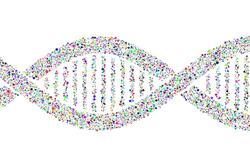A 1,000-Piece Puzzle: My Jewish Ancestral History
Twenty-four days ago, I spit into a tube. I did everything the 23andMe pamphlet told me to do: I didn’t eat or drink water for half an hour beforehand, I didn’t contaminate the sample, I applied the stabilizing chemical, and I carefully closed the packaging. In minutes, scientists whisked away the colorful box to the lab for processing. They extracted my DNA, copied it millions of times, genotyped my data, and ran countless scientific models. Any day now, I’ll refresh my inbox to find that my results are in.
And I’m expecting them to be completely useless.
I know that the results are going to say that I’m almost 100 percent “European Jewish.” This is not news to me; I have chronic stomach issues—I know that I’m an Ashkenazi Jew. When I ask my parents where my ancestors are from, they say, “the Pale of Settlement” or just “Eastern Europe.” This encompasses so much land and so many modern-day countries that I have no idea what it means. And I’m a curious person—I want to know more. Where exactly were the shtetls my family lived in? Why did each branch of my family have to leave Europe? I’ve been asking these questions since I learned to speak, and I’m still starved for answers.
I asked my friends of non-Jewish backgrounds and ethnicity how much they knew about their genealogy. I wanted to know who knew specific details about the towns, regions, and countries their families hailed from—details that I lacked for my own identities. I was shocked that many of them were able to list villages, towns, and cities: Zamora, Ahmedabad, Mumbai, Dakar, Avilés, County Clare, Potenza, Vinjamoor, Travandarum, Sicily, and Athlone. I found myself falling down a cyberspace rabbit hole, reading about the rich histories of other people’s families’ towns, and wishing that I would one day be able to do the same for myself.
My friends who were lacking in ancestral origin knowledge like me are the descendants of enslaved Africans. They couldn’t go back more than three or four generations without hitting dead ends. One friend knows she’s likely descended from ancestors in West Africa, but West Africa is a big region with at least sixteen modern countries. It’s a relatively unhelpful description like “Eastern Europe.” But for white Americans, tracking ship logs and census counts can provide crucial genealogical information—information that people whose ancestors were enslaved in the Americas typically can't access. Even after the Civil War and Reconstruction, government documents can be difficult to trace, and to make matters worse, companies like Ancestry.com seem to lack basic sensitivity to Black history.
While my friends of African ancestry face major roadblocks in tracing their family histories, the majority of my white Jewish friends are in the same boat as I am; some of them know countries that their families can trace their roots to, like Austria or Germany or Libya, but most of them know very few specifics. Even within the umbrella term of “Jewish Genealogy,” Ashkenazi Jews like me have the upper hand. Sephardi Jews and Mizrahi Jews can find even less content in DNA databases like Ancestry.com and 23andMe.
Why is it so challenging for me and countless other Jews to find the answers I so desperately seek? For one thing, a lot of Jewish people find it difficult to talk about their family history. Jewish history in any region of the world hasn’t exactly been a walk in the park. For another, name changes can cause dead ends. It was common for Jewish immigrants to the US to change their names in order to make it easier to pronounce for non-Jews, or to hide Jewishness altogether. And of course, a major obstacle is the destruction of records, synagogues, and entire Jewish communities—not just in Europe but also in North Africa and the Middle East. Some Jews are able to trace back their ancestry to whenever their family immigrated to the US, and the trail stops cold there.
That’s what happens to me.
I’ll spend hours poring over fragmented family trees and blurry census documents from the 1900s in the hopes of finding clues. Sometimes, I’ll follow a thread all the way to Ellis Island, only for the Ellis Island document to say that the country of origin is blank, or it just says “Hebrew.” Such a nebulous, antiquated term gives me no information about the origins of my family.
My ancestral history is like a 1,000-piece puzzle with half of the puzzle pieces missing. And even if I was to discover that I had ancestors from Poland, Germany, Russia, Belarus, Lithuania, Latvia, Ukraine, Hungary, or any number of other countries where Jews made their temporary home, I have to ask myself: why would I care? I saw something written by a Jewish Twitter creator that I’ve been turning over and over in my head: "Europe was never meant to be our home. It was meant to be our graveyard." These countries don’t care about me. They certainly didn’t care about my family. So why do I care about them?
I don’t know, exactly. The word that best describes it is “rootlessness.” Maybe it’s the generational trauma that comes from a people that has been running from one country to the next for centuries. Maybe that’s something to unpack with my therapist. The privilege of knowing where you come from is not the most obvious of liberties. But knowledge is power, and I want to have the knowledge of exactly where my great-great-great-great grandparents lived. I want to research their towns, and know what they ate, how they celebrated Shabbat, what their streets looked like, what hardships they faced, and what they thanked God for.
In Everything is Illuminated, Jewish author Jonathan Safran Foer writes that “Jews have six senses. Touch, taste, sight, smell, hearing … memory. When a Jew encounters a pin, he asks: 'What does it remember like?'” When I don’t have all the information, I can't remember. For now, though, I’ll continue to cling to the few puzzle pieces that I can discover, and try to find solace in my life in the present—in doikayt, in hereness—instead of yearning for the past.
This piece was written as part of JWA’s Rising Voices Fellowship.







I love this piece, thank you.
I cherish the fragments of information I've been able to glean, but they make me hunger for more and I realize I may never know anything more than what I already do.
Thank you for this moving essay. You’ve perfectly captured my feelings around not knowing.